
Pages:
<< Back 1
2 3 4
5 6 7
8 9 10
Next >>
The
DePauw chapter of Phi Beta Kappa, the national honorary society
for scholarship founded at the College of William and Mary in 1776,
was granted a charter in 1889, largely through the efforts of Dean
Shadrach Bowman of the School of Theology. Bowman, a Phi Beta Kappa
from Dickinson College, organized DePauw's Indiana Alpha chapter
in his classroom in Middle College with the assistance of two other
initiates from Terre Haute.
The first members elected were Professors James R. Weaver, William
F. Swahlen, and George L. Curtiss, former Professor John C. Ridpath,
local Methodist minister Salem B. Town, and two DePauw trustees.
Within a few days nine more were added: President John P.D. John,
ex-President Thomas Bowman,
the two sons of Washington C. DePauw,
and five trustees. In June Professors Edwin
Post and Philip S. Baker were elected along with two additional
trustees. Only then did the chapter get around to its original purpose
by initiating five men of the senior class. (Women were not elected
to membership until 1898, but at the chapter's 50th anniversary
in 1939 amends were made by belatedly adding the names of all surviving
female graduates who would have been eligible between the founding
and 1897.)
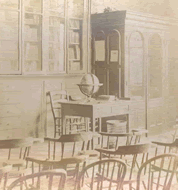 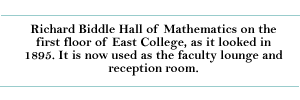
Weaver served as president and Swahlen as vice president for the
first 20 years. Most meetings were held during this time at the
Weaver home on South College Avenue. Tradition has it that strawberries
were always served. In its early years the DePauw chapter of Phi
Beta Kappa elected distinguished former students such as Governor
Albert G. Porter and Senator Albert J. Beveridge, as well as Hoosier
luminaries who had never attended the institution, including James
Whitcomb Riley and Edward Eggleston.
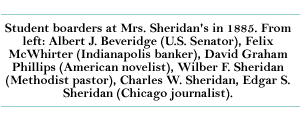
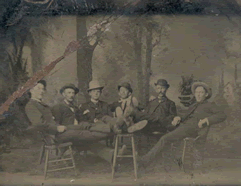
In his drive to modernize the university and raise academic standards,
President John closed the Normal School with its large number of
below-college level pupils and sought in vain to acquire improved
library and laboratory facilities. The only addition to the physical
plant during his tenure was Florence Hall, a dormitory erected in
South Park on the present site of Bishop Roberts Hall in 1891, through
the generosity of Washington C. DePauw's
widow and daughter. Designed primarily for the use of students in
the School of Theology; it later became a general rooming and dining
hall for men.
DePauw's death in 1887 and subsequent litigation of his will along
with the reduction in the value of the estate's assets caused by
the Panic of 1893 brought about lowered estimates of the financial
assistance the university might expect to receive from that quarter.
In fact, by the time the estate was settled in 1895, the total amount
of the DePauw benefactions, including gifts from other members of
the family, came to approximately $300,000, far below the anticipated
$1 million, but still a munificent sum for that time.
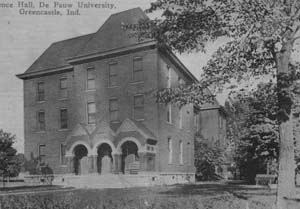
__________________________________
Florence Hall on south College Avenue was
built in 1891 as a
rooming and boarding
dormitory for the theological students. It
was a gift of Mrs. Frances DePauw, widow
of the university benefactor, and named for
their daughter. After 65 years of use as both a
men's and
women's dormitory, it was
demolished to make room for Roberts Hall.
__________________________________
At
any rate the John administration faced a financial crisis less than
a decade after the refounding of the institution as DePauw University.
Faculty salaries were reduced and educational programs reorganized.
When Dean Mills resigned from his post in the Art School in 1893
and Dean Howe from the School of Music the following year, the administration
decided to economize by appointing Professor Belle Mansfield to
head both institutions, receiving a portion of the proceeds from
student fees in lieu of salary. Mansfield, who had been preceptress
of Ladies Hall as well as professor of both history and aesthetics
at DePauw, brought the two schools to a measure of prosperity by
efficient management. The Law School, however, experiencing falling
enrollments, was allowed to expire by the spring of 1895, while
the School of Theology limped on for another few years.
Back
to Top
Pages:
<< Back 1
2 3 4
5 6 7
8 9 10
Next >>
|





